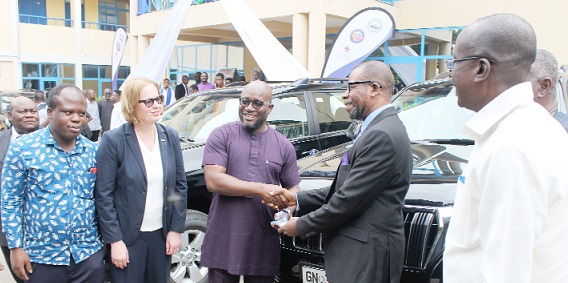
MiDA inaugurates energy service centres
The Millennium Development Authority (MiDA) has inaugurated three sustainable energy service centres (SESCs) to train professionals to assist organisations to adopt cost-effective energy-saving measures in their operations.
The centres were established in collaboration with the Energy Commission at the cost of $284,928 at the Kwame Nkrumah University of Science and Technology (KNUST) in Kumasi, Ashanti, the University of Energy and Natural Resources (UENR) in the Western Region and the Accra Technical University (ATU).
The centres have been provided with offices, energy audit instruments, IT equipment and a vehicle each.
Significance
At the inauguration of the centres at the ATU in Accra yesterday, a Deputy Minister of Energy, Andrew Egyapa Mercer, said the SESCs, which were the first in the country, had the potential to provide vital services across West Africa.
He said the centres were part of the country’s power compact programme's energy efficiency and demand side management (EEDSM) project funded by the Millenium Challenge Corporation (MCC), an agency of the United States (US) government and the Government of Ghana.
“Like all commodities, power is finite, and it is, therefore, important to ensure that it is managed effectively and efficiently at all levels of the value chain.
“If done properly, this will ensure adequate and available power supply and also provide consumers in particular, with significant savings,” the minister said.
According to him, MiDA had been a valuable strategic partner in the power sector over the years, providing significant infrastructural support through the power compact agreement which he said had improved power delivery system and brought relief to many communities.
Commendation
The Chief Executive Officer (CEO) of MiDA, Martin Eson-Benjamin, commended the Energy Commission for its vision in pushing for and supporting the authority to complete the pilot centres, adding that it could be extended to other institutions.
“The SESCs are part of the innovative approaches to ensure the efficient use and conservation of power and have the potential to reach out and serve entities across the country and the West Africa sub-region,” he added.
The staff in each centre, Mr Eson-Benjamin said, had been given the requisite technical training on various aspects of energy management and audit through three certification programmes - sustainable energy management professional (SEMP), sustainable energy audit professional (SEAP) and energy audit practicals (EAP).
Investment
The Deputy Chief of Missions at the US Embassy, Nicole Chulick, said the MCC power compact invested $316 million to improve power infrastructure, advance energy efficiency programmes and expand opportunities to women and youth in the power sector in the country.
Energy auditing, she added, was a growing niche industry where students and early professionals in science, technology and engineering fields of study could forge a career path.
The Vice-Chancellor of the ATU, Professor Samuel Nii Odai, gave assurance that the students would make good use of the equipment at the centre.
He said the centre would allow for certification in "technical and vocational skill training in energy audit, renewable energy design, installation and troubleshooting among other sectors.
The Vice-Chancellor of the UENR, Professor Elvis Asare-Bediako, also said the university had been collaborating with industry to provide technical expertise in energy management, planning, design, construction, operation and maintenance of projects.
